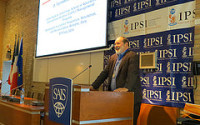by David Carpenter, Canada
Peacemaking is difficult. That is the lesson I learned from our first foray into conflict prevention: The Simulation of the OSCE in the Ukraine-Crimea Crisis.
With a Model United Nations/Crisis Simulation background, I do not have experience in the art of conflict prevention. We are taught to debate, think creatively, and advance the interests of the country, organization or body we represent; rarely ever do we seek a lasting peace. More often than not, our purpose is to aggravate conflict, antagonize others, and pounce on their vulnerabilities.In contrast, peacemaking is not only difficult, it’s boring. Violence and corruption are far more exciting than peace, so why bother learning how to prevent conflicts? How do we go about solving problems that have been around much longer than we’ve been alive?
But then, all of my experiences had been in the safe confines of academia. There was no real threat to be solved, only contemporary issues to be satirized. Here in Bologna, however, we are being taught the important skills necessary to conflict prevention. While the academic setting remains, the threats are very much real and one day we might be the ones tasked with solving them.
Our goals for the day were, as members of the Organization for Security and Cooperation in Europe (OSCE), to achieve consensus on a final agreement within the following:
- An analysis of the conflict
- A plan of detailed actions for the OSCE with regard both to Crimea and to the conflict within other regions of Ukraine
- A summary of recommendations to the parties to the conflict to serve as options to resolve their disputes politically without resorting to violence.

Dr. Hopmann facilitating the OSCE siumlation at the SAIS Bologna Center
I am sad to report that we failed dismally. With Ukraine and Russia so diametrically opposed in their viewpoints and most other countries’ foreign policies being dictated on high by regional powers able to throw their weight around, nothing more was accomplished than speaking in vague generalities about the need for a ceasefire… at some point.
We couldn’t even agree on whether violence in eastern Ukraine and the Crimea was the true priority or if it was ethnic tensions and the need for greater autonomy. Our final plan lacked the most basic details and essentially the only recommendations we could make to the disputing parties was that the OSCE would meet several months in the future to discuss the matter further. Then, and only then, would actual recommendations be issued.
I won’t pretend that the process wasn’t frustrating. We did the best we could with our training from the previous day but, in the end, it wasn’t enough to prevent the Ukrainian conflict from descending further into chaos. As someone used to getting my way in the Model United Nations world, it was a very humbling experience.
But it is from failure that we learn. The losers (i.e. all of us) were forced to do some soul searching. With one day’s worth of training, the simulation was akin to being thrown to the wolves.
We are still in the early stages of discovering what went wrong. But that’s the point, isn’t it? Without hands-on training in the various aspects of conflict management we are left wandering in the dark, blindly searching for answers with little hope of achieving success.
The training we are receiving every day now is our guiding light. When the next simulation comes, we will be ready. Armed with our plethora of knowledge on conflict management and equipped with every tool in the peacemaker’s toolbox, I have no doubt that we will rise to the occasion and deliver meaningful results.
This may not be the playacting Model United Nations experience I’m used to at my university, but our aims are much greater than simply monopolizing discussion in the hopes of winning some insignificant award. Here in Bologna the ultimate prize is peace. Every day we’re getting closer to achieving that goal and I am loving every minute of it.

